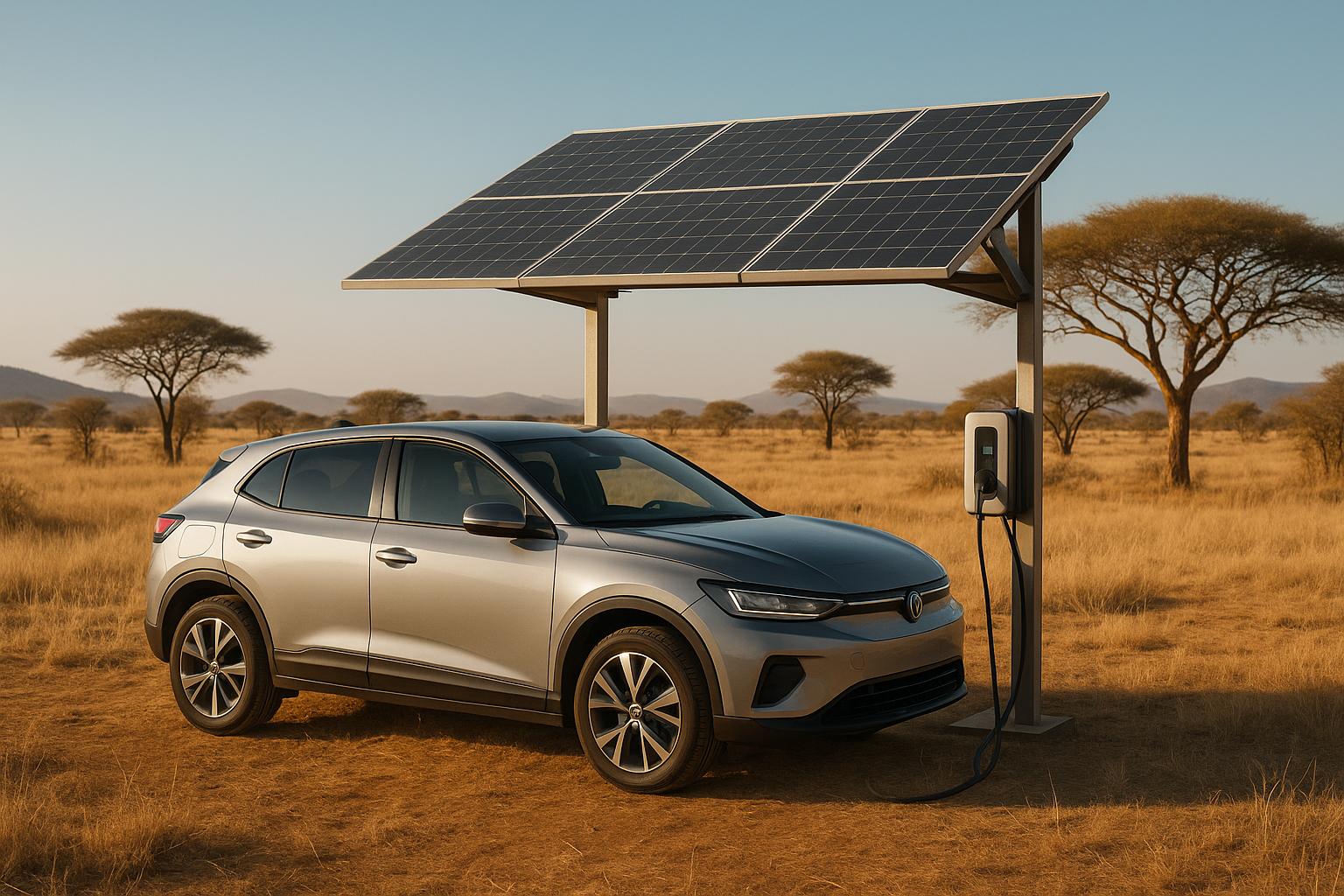
Off-grid EV charging is transforming how Africa addresses energy access and climate challenges. By using renewable energy sources like solar and wind, these systems power electric vehicles without relying on unreliable or expensive grid infrastructure. Here’s why this matters:
- Energy Access: Many rural areas in Africa lack consistent electricity. Off-grid charging serves remote communities and supports critical services like schools and clinics.
- Climate Impact: Transportation heavily relies on fossil fuels, contributing to pollution and climate risks. Solar-powered stations reduce emissions and dependency on oil imports.
- Economic Growth: These systems create jobs in installation, maintenance, and new industries like battery recycling, while also keeping energy spending local.
- Resilience: Off-grid setups remain operational during power outages, ensuring uninterrupted services during extreme weather or blackouts.
With advancements in solar efficiency, battery storage, and government support, off-grid EV charging is helping Africa leapfrog infrastructure challenges and move toward cleaner transportation and energy independence.
We visit South Africa’s first completely off-grid EV charging station
Climate Benefits of Off-Grid EV Charging
Off-grid EV charging isn’t just about improving energy access – it also plays a key role in reducing environmental impact and advancing Africa’s shift toward cleaner, more sustainable transportation.
Cutting Down on Fossil Fuel Use
One of the biggest perks of off-grid EV charging is its ability to reduce dependence on imported fossil fuels by tapping into local renewable energy sources like solar and wind. Currently, African nations collectively spend billions on petroleum imports, with transportation accounting for nearly 30% of the continent’s oil consumption. Solar-powered charging stations, however, convert sunlight directly into energy for vehicles, cutting out the need for oil altogether.
This approach not only slashes carbon emissions from both vehicle use and fuel transport but also keeps energy spending within local economies. For example, countries like Morocco and South Africa have shown that solar charging can lower transportation emissions by as much as 80% compared to traditional gasoline-powered vehicles. It’s a significant step toward energy independence.
Staying Operational During Power Outages
Off-grid charging systems bring a level of reliability that traditional grid-dependent setups often can’t match. They remain functional even during extreme weather events, ensuring that essential transportation services continue uninterrupted. Whether it’s a storm, drought, or equipment failure knocking out the main grid, off-grid stations stay up and running.
By integrating battery storage with renewable energy generation, these stations provide 24/7 charging availability – even during prolonged blackouts. This reliability is crucial for emergency services, medical transport, and supply chains that can’t afford delays during climate-related disasters.
Advancing Climate and Renewable Energy Goals
Off-grid EV charging aligns perfectly with Africa’s climate commitments, helping reduce emissions while accelerating the adoption of renewable energy. Many African countries have pledged to lower carbon emissions as part of international agreements, and electrifying transportation is a key strategy in achieving those targets.
What’s more, these off-grid charging stations often double as community energy hubs, extending their benefits beyond transportation. They not only support the push for greener energy but also address immediate development needs, reinforcing the continent’s broader move toward a sustainable future.
Economic and Social Impact of Off-Grid EV Charging
Creating Economic Opportunities
Africa’s push toward off-grid EV charging solutions isn’t just about clean energy; it’s also unlocking economic potential and boosting energy independence.
These charging hubs generate revenue and create jobs. For instance, landowners can earn by leasing their property, while the development of this infrastructure opens up roles in manufacturing, installation, and maintenance. It’s not just about the landowners – this growing sector offers employment opportunities across various industries.
Charging stations also attract visitors, which can breathe new life into local businesses. As the network of stations grows, it spurs the rise of new industries. For example, the expansion of e-mobility infrastructure is paving the way for sectors like battery recycling and repurposing, adding more layers to the economic landscape.
sbb-itb-99e19e3
Technology Advances and Case Studies
Advances in Off-Grid Charging Technology
Across Africa, strides in off-grid EV charging are transforming how vehicles are powered in remote areas. While specific data is still emerging, key advancements are making these systems more efficient and practical. Solar integration techniques, cutting-edge battery storage, digital management tools, and modular designs are reshaping how off-grid charging operates. These innovations are already being tested in pilot projects, offering a glimpse into their potential real-world impact.
Case Studies of African Projects
Several projects underway across Africa highlight the promise of off-grid charging solutions. Although most are still in their infancy, they provide critical insights into how these systems can be scaled for broader use. Each project serves as a learning opportunity, offering lessons that could guide future implementation across the continent.
Lessons from Leading Projects
The success of these initiatives often hinges on a few key factors: involving local communities early on, offering a variety of service models, investing in local technical training, designing infrastructure with scalability in mind, and fostering collaboration among stakeholders. Together, these elements create a solid foundation for sustainable off-grid charging networks. They also showcase how technological advancements can turn off-grid EV charging into a meaningful climate solution for Africa.
Challenges and Future Outlook
Barriers to Adoption
While advancements in solar and battery technology have made off-grid EV charging more feasible, the path to widespread adoption still encounters hurdles. Aligning financing mechanisms and supportive policies remains a critical challenge that must be addressed to ensure broader implementation.
Factors Driving Growth
Despite these obstacles, several factors are fueling the growth of off-grid EV charging. Improvements in solar panel efficiency and battery storage technology are making such projects more practical and appealing. For instance, Tanzania’s EV market is expected to grow significantly – from US$0.04 billion in 2025 to US$0.22 billion by 2030, reflecting a compound annual growth rate of 40.5%. This rapid expansion is supported by Tanzania’s renewable energy landscape, where renewables account for 60% of the country’s energy capacity.
Additionally, innovative financing models and supportive government policies are playing a key role. A notable example is Zero Carbon Charge‘s R100 million (US$5.6 million) investment secured from the Development Bank of Southern Africa. Meanwhile, Tanzania’s commitment to reducing emissions by up to 35% by 2030 further underscores the push for off-grid EV charging solutions.
Future Trends in Off-Grid EV Charging
Looking ahead, the future of off-grid EV charging points to even greater integration and efficiency. Commercial fleet charging is poised to grow, as fleets provide a steady demand for electricity – typically around 10–20 kWh per EV daily – making operations more efficient and predictable.
Smart charging technologies are also on the horizon, promising to optimize energy use by aligning it with available generation and storage. Beyond technology, regional partnerships and revenue-sharing models, such as collaborations with local landowners, are expected to attract more investment and support the development of sustainable infrastructure. These trends indicate a promising path forward for off-grid EV charging systems.
Conclusion
Off-grid EV charging offers a promising solution to Africa’s energy challenges while contributing to global climate goals. Research shows these systems can help combat climate change, expand energy availability, and create economic opportunities across the continent.
By cutting reliance on fossil fuels and bolstering grid resilience, off-grid EV charging aligns with the ambitious climate targets set by African nations, helping to reduce emissions and drive progress.
This infrastructure is also playing a key role in accelerating the growth of Africa’s electric vehicle market. With innovative financing models and strategic investments, these solutions are scaling up to improve energy access and support market expansion.
Technological advancements are making off-grid charging systems more practical and reliable, especially for commercial fleets. Enhanced solar panel efficiency, improved battery storage, and smart charging technologies are drawing more investments into sustainable infrastructure. These developments are being fueled by regional partnerships and creative revenue-sharing models, even as challenges persist.
While hurdles remain – such as the need for better financing mechanisms and supportive policies – the progress is undeniable. Off-grid EV charging is emerging not just as a climate solution but as a driver of economic and energy transformation. It offers Africa a path to bypass traditional energy infrastructure limitations and move toward a more sustainable future.
Platforms like EV24.africa are paving the way, making electric vehicles accessible across all 54 African nations and supporting the development of infrastructure that will enhance the value of off-grid charging in the years to come.
FAQs
How do off-grid EV charging stations support Africa’s energy independence and economic growth?
Off-grid EV charging stations are making a big impact in Africa by tapping into renewable energy sources like solar power. These stations provide a cleaner energy alternative for electric vehicles, cutting down the dependence on fossil fuels and addressing the challenges of unreliable national grids.
What’s more, decentralizing energy production with off-grid solutions opens up new economic opportunities. It creates jobs in areas like renewable energy and EV infrastructure, while also improving energy access in remote communities. These systems help ease the strain on existing power grids and support long-term growth, boosting economic stability and resilience across the region.
What new technologies are improving off-grid EV charging in Africa?
Recent progress is transforming off-grid EV charging into a more efficient and dependable solution across Africa. One standout development is vehicle-to-grid (V2G) technology, which allows electric vehicles to support the power grid by supplying electricity during times of high demand. In addition, solar-powered charging stations paired with battery storage systems are making a big difference in remote areas, offering a steady energy source by using renewable power.
Another game-changer is the introduction of liquid-cooled charging cables, which tackle heat management issues. These cables enable faster charging and higher power delivery by keeping temperatures under control. Together, these advancements are shaping a stronger and more adaptable off-grid EV charging network, paving the way for wider adoption of electric mobility across the continent.
What challenges are slowing down the adoption of off-grid EV charging in Africa, and how are they being overcome?
The push for off-grid EV charging in Africa comes with its fair share of obstacles. Among the most pressing are unreliable electricity supply, limited infrastructure in rural regions, and high upfront costs for building charging networks. These factors create significant hurdles in establishing a dependable and accessible system across the continent.
To tackle these issues, solar-powered off-grid charging stations are being introduced. These stations operate independently of the electricity grid, offering a steady energy source even in remote locations. In addition, hybrid renewable energy systems – blending solar with other energy sources – are being developed to improve reliability and reduce dependence on unstable power grids. These advancements are helping lay the groundwork for a more reliable and accessible EV charging network in Africa.




